A few hours ago, I finished writing a piece about global investing through a Roth IRA, which was published to the About.com network. It got into some of the complexities of foreign investing, including the differences between share classes domiciled in various markets and currency translations. As I was thinking about whether there was anything I could change to make it clearer, I decided to bake some fresh bread for this week, and split the massive loaf into multiple smaller and mini-sized loaves to test various ingredients and flavors. The end game is to completely replace all store bought bread with fresh, homemade bread. I also decided to make fresh strawberry jam for this week to have during breakfast.
[mainbodyad]As I was mixing ingredients, listening to the Playstation battles being fought in the next room, I was being me. In that, I mean my mind was running three or four different processes at the same time. If you’ve read the blog for long, you know I have a habit of knowing the history of the people, business, products, political bodies, and religious institutions around me; there are countless small examples of this in my writing expressed over and over. I love history. I’m curious to know how the things around me came into existence.
When I picked up the Quaker Oats box of steel cut oats, I thought about Henry Parsons Crowell, who was born sometime in the 1850’s, buying the bankrupt oat mill and turning it into Quaker Oats, giving away 70% of his annual income and his entire fortune in death, which still exists in the form of a $100,000,000+ trust that funds evangelical causes in the United States (here is a PDF of the most recent tax return). He was born extremely rich but decided to become an obsessive workaholic with all of his labor going back to society because he believed that he, personally, owned nothing, but rather that it was simply held in stewardship for God, who would judge him based on how he used the funds.
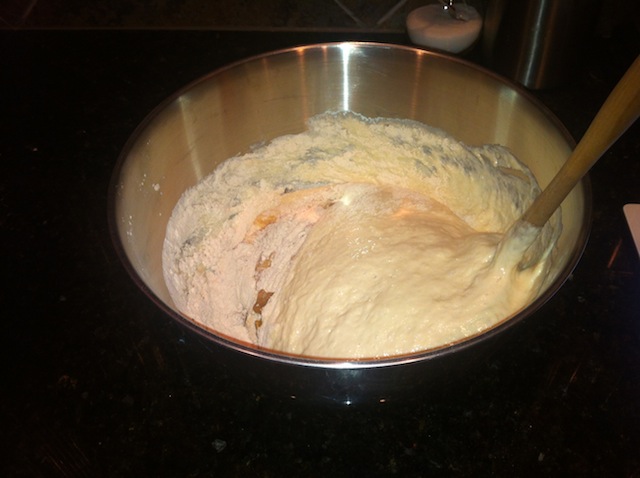
Mixing a few natural ingredients that were grown from the ground can make bread. There is something fundamental and awesome about it.
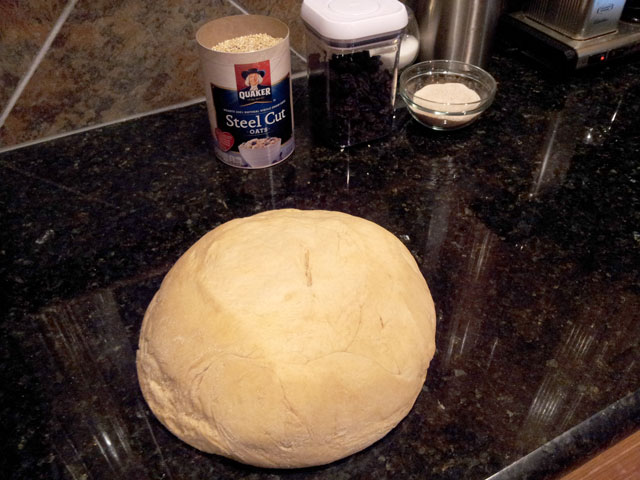
I spent the evening publishing all of the December content for About.com, and thinking through some new ideas for next month as I experimented with bread recipes. I split this giant bread dough loaf into four miniature bread loaves and one normal size loaf, some of which were cinnamon, sugar, and raisin, others of which were traditional whole wheat honey-infused oat bread for sandwiches.
I thought about one of his business partners, Ferdinand Schumacher, who was called The Oatmeal King in his Ohio home town. Schumacher left Germany as a 28 year old man and came to the United States to make a new life for himself. He ended up in the grocery industry and owned one of the founding mills that became part of Quaker Oats. The courage it takes to pick up and leave everything to start a new life is inspiring. This was a real man. He had to get on a boat and start over, yet he ended up a founder of a simple but prosperous business.
I thought about the fact that for decades, this oatmeal giant owned Fisher Price toys and was responsible for the Willy Wonka movie, which was really just an extended advertisement to launch new products. I thought about how Warren Buffett killed Coca-Cola’s attempt to buy Quaker Oats based on valuation (that was an entire soap opera in the financial press at the time) and it ended up part of PepsiCo.
And I thought about how I now own shares of PepsiCo and cash from all of that history gets deposited into my account. It’s all just interconnected. It’s life. It’s people. As I stand in my kitchen baking with this product that stretches back a century and a half, the company that manufactures it is shipping some of the funds to my brokerage and retirement accounts, which I then use to enjoy life. Why? Because I used my own money, earned through my own past efforts and contributions to society, to write checks and become an owner.
These were real people. Quaker Oats represented their hopes and dreams. It changed American history. Nothing you do is unimportant. It’s all connected to everybody else.
That is one of the things that was going on in my head. It’s not really words, it’s just this entire pipeline of thoughts, images, and feelings that encompass those things all at once. It’s hard to explain.
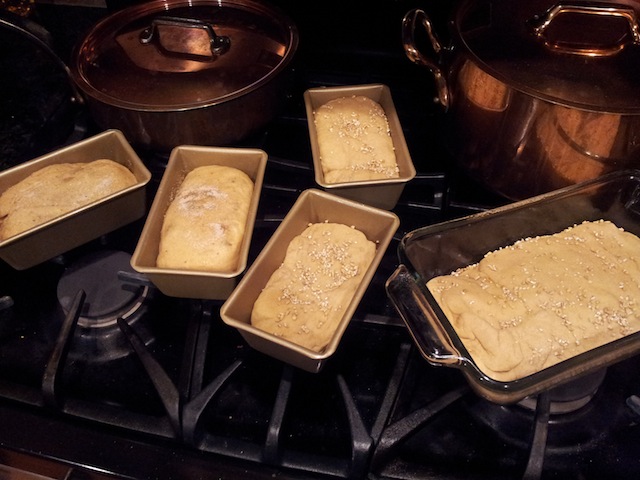
Right now, as I type this, the bread loaves are sitting on the stove rising. They need to be around 1 inch above the top of the bread pans before I can put them into the oven.
Anyway, as I baked, or rather as I switched to making strawberry jam, I also thought about farming. I think the United States has lost a tremendous amount of important values and virtues that came from a society tied to the land.
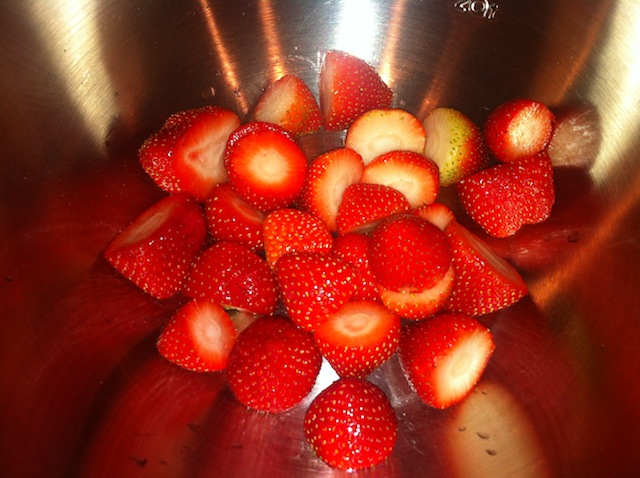
Fresh strawberries,which I had to mash down into a pulp.
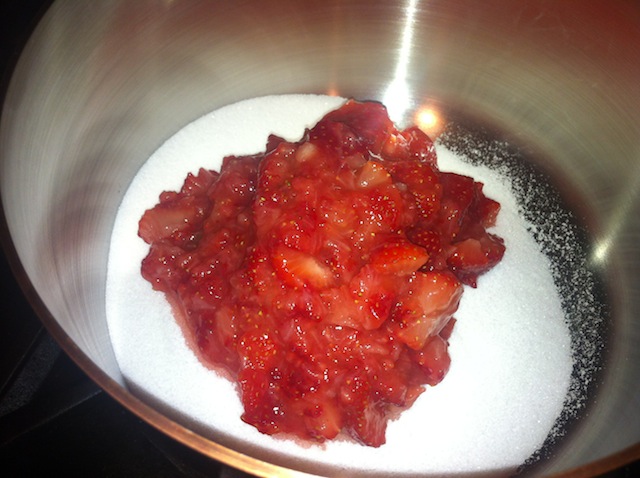
Adding the strawberry pulp to sugar and lemon juice to make the jam …
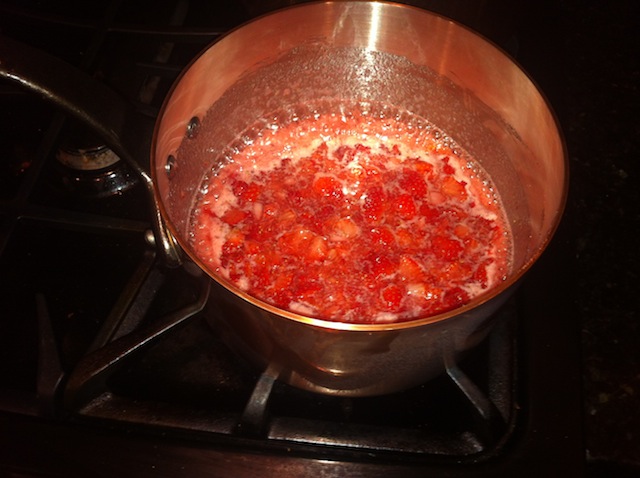
Cooking down the strawberry jam to the point it could be cooled. It will all be used this week so there is no storage jar or preservatives. It’s as fresh as it can get and will be used during breakfasts.
Don’t get me wrong – things are still great. In my lifetime alone, we’ve gone off the charts and I am only 30 years old. We talked about it several years ago – prosperity is at an all-time high for most demographics, education levels are at an all-time high, longevity is at an all-time high, free time per week is at an all-time high, individual freedoms continue to expand (despite the setbacks of the surveillance state, which I consider an enormous risk to the survival of humanity in the long-run), and a person born today is generally more able to pursue his or her passions, and make a go of whatever they desire in life, than any other people, at any other time, throughout all of recorded history. Murders are at multi-decade lows. Teen pregnancy and abortion rates have been plummeting for decades. The list goes on and on, with only a few dark spots, the most worrying for future demographics being the fact that a majority of children are born into broken homes, which correlates very strongly with lower achievement, lower opportunity, and lower life outcomes. Exceptions exist, but that is the data.
If Things Are So Good, What Did We Lose?
So when I say we lost something, I mean the lessons that are inherent to living in a situation where you see cause-and-effect play out, you learn about delayed gratification through the concepts of sewing a crop today to reap a harvest a season from now, putting up provision for the future by storing surplus food, money, and supplies to make it through the winter, and learning that if you want something, you have to do it yourself or work in cooperation with your neighbors.
Humans are wired so that much of the lessons we learn – and the scripts we play out in our heads throughout life – are absorbed through osmosis during the first 15 to 16 years. How you feel about money, politics, music, and so much more is absorbed into your psyche, just as chemicals in the water can be absorbed into your bloodstream. Sometimes people escape their childhood indoctrination, more often than not, they don’t. It is those lessons – what could have been picked up through osmosis – that I think are valuable.
[mainbodyad]If I had lived on a farm back in the 1850’s and wanted strawberry jam, I would have had to grow, or trade for, strawberries in the summer, and then put in a day of working, preserving them for the winter. This is basic operant conditioning. If you want something worthwhile, you have to make the investment today and wait. I don’t think it is an accident that some of the most successful investors I’ve ever met firsthand or heard about second hand have farming backgrounds. One of the most famous mutual fund managers of the past few decades, Ronald Muhlenkamp, has even written about this phenomenon.
But it’s more than that. It’s a general awareness about the world. It used to be that if you wanted meat, you had to go out and slaughter the cow yourself. Now people just pick up packaged beef and have no idea where it comes from, how it is made, or the conditions under which it is brought to market. There is a strong moral case that if you are incapable of picking up a shotgun and shooting a cow, you shouldn’t be eating meat.
It used to be if you wanted the bank to loan you money, you had to be an upstanding member of the community, with a reputation people could trust, and assets to back your signature. Now, people lie on credit applications and get pieces of plastic that let them borrow cash at 30% interest rates.
For all of the advancements we’ve made – and there is no time I would rather be living – the people who don’t have some sort of family connection to the farm are poorer because of it. Some of my friends were born, live in, and have never left a major metropolitan area. They are clueless. If society were to ever fall apart, or any period of extended hardship happen, they wouldn’t be physically, intellectually, or emotionally prepared. They have no idea how to make hot cocoa or mayonaise from basic ingredients – if there were no grocery store, they would be lost. They have no idea how to write in cursive (this isn’t a joke – do a quick search about the ability of the 20-and-younger crowd to write long-hand). They have no idea how to start a fire or navigate by the stars.
It reminds me of that scene in The Avengers when the sky fortress is going down and the crew is panicked, saying they can navigate. Samuel L. Jackson yells, “Is the sun in the sky?” and you suddenly see it dawn on them that they have the knowledge necessary to function. People don’t make those connections. I don’t understand it. It’s right there, in front of all of us.
It’s one of those nights where I’m examining who we are as a nation and thinking about how history will view this time in which I live. We have achieved so much but we let some very important things fall by the wayside at some point during our journey.
Who knows? Maybe Teddy Roosevelt was right. Maybe Frontier Theory really was accurate and it was at that point, when the west was conquered, America’s soul changed. People haven’t changed, though. The moment we can colonize the moon or Mars, that same spirit will once again burst forth and you’ll have people setting out to establish new communities and try new things. It’s in our DNA.
Sometimes I think I have the soul of a New Hampshire farmer who lives on the land passed down to him for eight generations; sitting at home, reading by the fireplace, spending time with family, cooking excellent food, and thinking.
I’ll stop now … it’s 3:11 a.m. and I should be in bed. My bread just came out of the oven so I should be winding down for the evening.
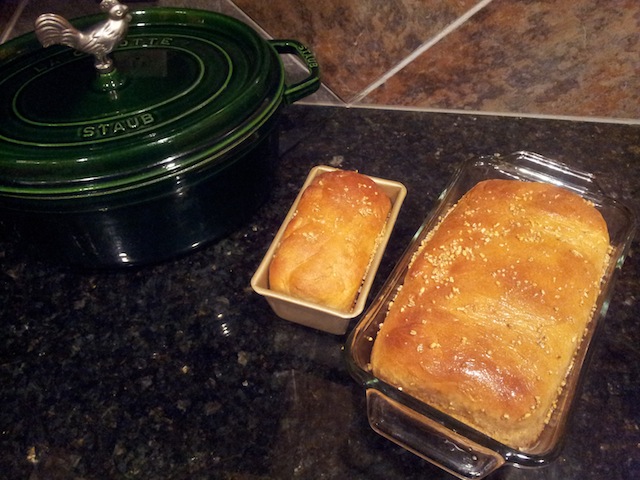
The bread turned out beyond my expectations. It is a whole wheat, honey-infused sandwich bread that has only a handful of ingredients that include two types of flour, honey, water, salt, yeast, and oats. I just buttered the top and need to let it cool so it is ready for tomorrow. The alternative, cinnamon-sugar-and-raisin versions also turned out excellent, though I needed to increase the cooking time due to a change in chemistry.
Update: For breakfast this morning, I had some of the cinnamon, sugar, and raisin honey wheat bread covered in the strawberry jam. It was amazing. I am going to tweak a few more things and I might post the recipes in the coming months.
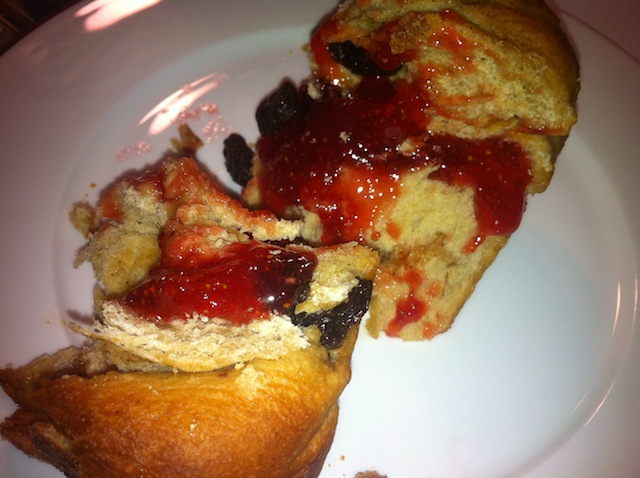
The cinnamon, sugar, and raising honey-wheat bread covered in strawberry jam was on my breakfast plate this morning. It is fantastic. I am going to double and triple check the process and then probably write about how to make it, like we did with the cinnamon rolls everyone loves.


